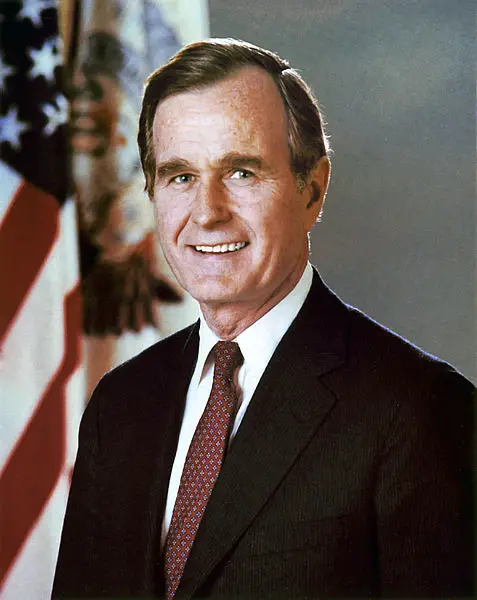George H.W. Bush
(1924 - )

George Herbert Walker Bush was the 41st president of the United States, serving from 1989 to 1993.
Bush was born in Milton, Massachusetts, in 1924 to a prominent New England family. He is the son of Prescott Bush, a United States senator from Connecticut. After distinguished war service and graduation from Yale, he moved to Texas to make his fortune in the oil business. After losing a bid for the Senate in 1964, he was elected to the House of Representatives in 1966. He ran again for the Senate in 1970 and was again defeated. He then served as U.S. ambassador to the United Nations (1971–72), chairman of the Republican National Committee (1973–74); chair of the Liaison Office in Beijing (1974–76) and director of the CIA (1976–77). In 1980, he ran unsuccessfully for the Republican presidential nomination and then accepted Ronald Reagan's offer of the GOP vice presidential nomination. He served two terms as vice president (1980–88) and won the presidency in 1988, soundly defeating Democratic candidate Michael Dukakis, a Massachusetts liberal whose wife was Jewish, by carrying 54% of the vote. The Jewish community, however, supported Dukakis by a margin of almost two to one. After reaching pinnacles of popular support for his victory in the 1991 Gulf War, he lost a three-way election in 1988 to William Jefferson Clinton.
For many in the Jewish community, Bush's presidency could be encapsulated in his offhand quip to reporters in September 1991 during an AIPAC lobbying effort on Capitol Hill in support of the proposed $10 billion loan guarantee to Israel: "I'm one lonely little guy" up against "some powerful political forces" made up of "a thousand lobbyists on the Hill." The comment triggered a spate of antisemitic letters and comments for which the president later apologized.
Bush had opposed the loan guarantees as long as Israel continued settlement in the West Bank and Gaza. The president finally agreed to a loan guarantee package in August 1992, requiring as a set-off any funds Israel spent to build housing or infrastructure in the territories. Despite this action, the political damage was done. The loan guarantee controversy later motivated Jewish opposition to President Bush, who received no more than 12% of the Jewish vote in the 1992 election (down from close to 35% in 1988). While some claimed that Jewish opposition to Bush caused his 1992 defeat, there is little evidence that this was the case. Other actions had caused problems with the Jewish community as well. In March 1990, Bush expressed objection to "new settlements in the West Bank or in East Jerusalem." His reference to eastern Jerusalem and his suggestion that it was not a sovereign part of Israel created a furor and added to strained feelings between Israel and the U.S.
Bush's relations with the Jewish community, however, were far more nuanced than the issue of loan guarantees. As vice president, he personally spearheaded Operation Joshua, the 1985 rescue of Ethiopian Jewry, and was involved in every step of the U.S. military's manning and execution of that mission. In 1991, America was a key to the success of Operation Solomon, which brought 14,000 more Ethiopian Jews to Israel. In 1991, the Bush administration succeeded in reversing the infamous U.N. resolution that equated Zionism with racism.
In addition, the aftermath of the 1991 Gulf War led to a heightening of the military relationship between the two countries. Central to Bush's strategy was keeping Israel from entering the war and thereby placing the U.S. in the role of Israel's protector from an irate Iraq. Patriot anti-missile batteries were sent to Israel to provide protective cover. In the end, Iraq sent missiles towards Israel, and while they caused terror among the population, and isolated property damage, only one person was killed. Israel's responsiveness to U.S. strategy needs led to an intensification of the military relationship. Intelligence sharing, joint exercises, access to military, equipment, and personal relationships among military personnel reached new levels. The Bush Administration financed much of the Arrow anti-missile program and created the concept of prepositioning of U.S. arms in Israel.
Bush's perception problem with the Jewish community grew, in large measure, from the views and actions of his Israeli counterpart for much of his term, Prime Minister Yitzhak *Shamir . Shamir's "tough" line on issues related to settlements and to negotiations with the Palestinians would have made his relations with most American presidents delicate at best. Secretary of State James Baker's widely reported statement, "Bleep the Jews; they didn't vote for us anyway," did little to help.
One of the major achievements of the George Herbert Walker Bush administration was the Madrid Peace Conference of 1991, which reopened the door to the Middle East peace process and indirectly to the Oslo accords. Bringing all the parties to the table in Madrid was a triumph for Bush's Secretary of State James Baker, who alternatively applied carrots and sticks to cajole the parties to sign on.
Sources: Encyclopaedia Judaica. © 2008 The Gale Group. All Rights Reserved.


